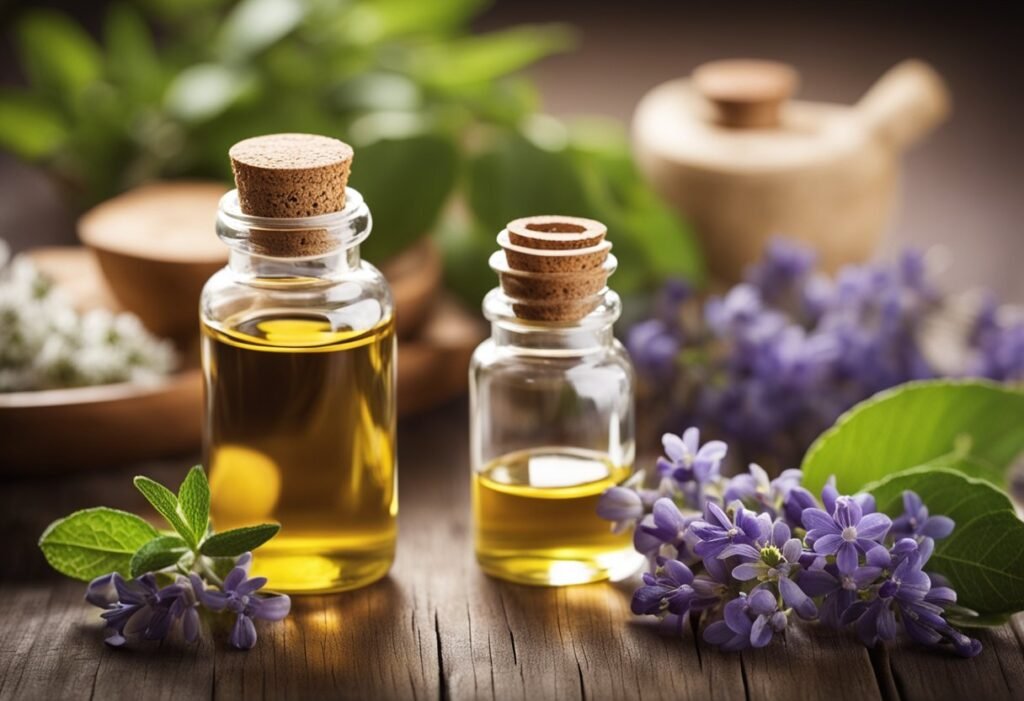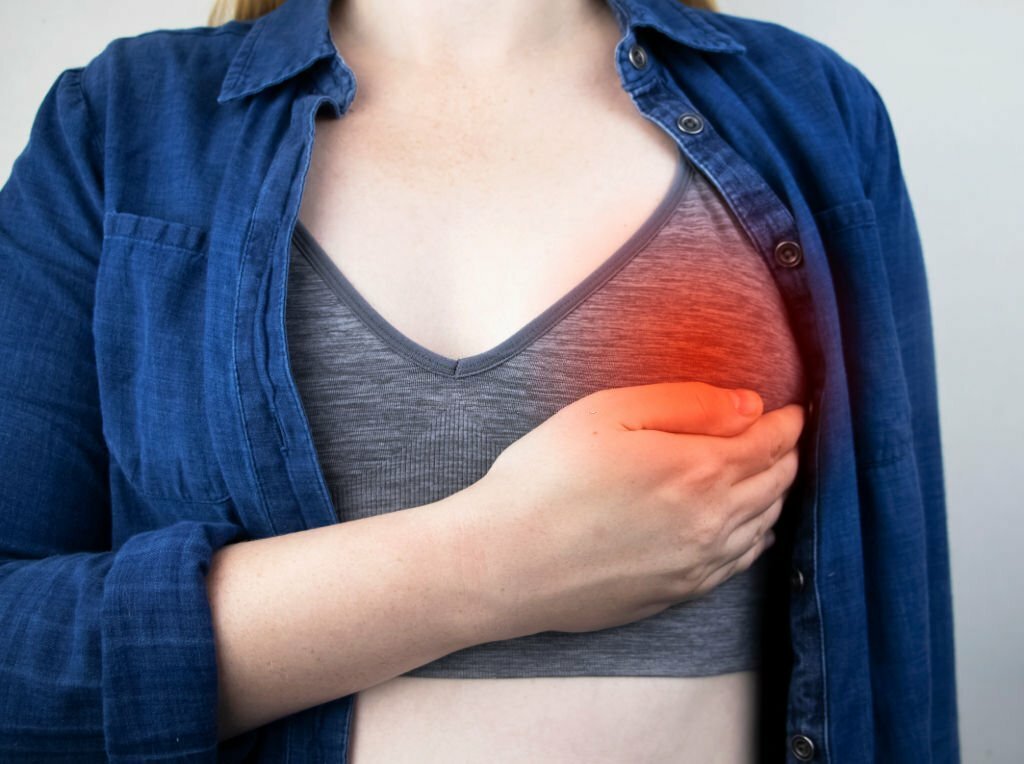Essential oils have been used for centuries to treat a variety of ailments, including mastitis. Mastitis is a common condition that occurs in breastfeeding mothers, causing inflammation and swelling in the breast tissue. While antibiotics are often prescribed to treat mastitis, some women prefer to use natural remedies, such as essential oils.
One essential oil that has been shown to be effective in treating mastitis is tea tree oil. Tea tree oil has natural antibacterial and anti-inflammatory properties, making it an ideal choice for treating infections. It can be applied topically to the affected area or added to a warm compress for added relief.
Another essential oil that may be helpful in treating mastitis is lavender oil. Lavender oil has natural antiseptic properties and can help reduce inflammation and pain. It can be applied topically to the breast tissue or added to a warm bath for added relaxation. It is important to note that essential oils should always be used with caution and under the guidance of a healthcare professional.
Understanding Mastitis

Mastitis is a common condition that affects breastfeeding mothers. It is an infection that occurs in the breast tissue, causing swelling, redness, and pain. Mastitis usually affects one breast at a time, but it can occur in both breasts.
Mastitis can be caused by a number of factors, including a blocked milk duct, bacteria entering the breast through a cracked nipple, or an overgrowth of bacteria in the milk ducts. It is important to seek medical attention if you suspect you have mastitis, as it can lead to more serious complications if left untreated.
Symptoms of mastitis include:
- Breast tenderness and pain
- Swelling and redness in the breast
- A fever and flu-like symptoms
- A lump or area of hardness in the breast
While mastitis can be a painful and uncomfortable condition, there are natural remedies that can help alleviate symptoms. Essential oils have been shown to have anti-inflammatory and antimicrobial properties that can help reduce swelling and fight off infection.
It is important to note that while essential oils can be helpful in relieving symptoms, they should not be used as a substitute for medical treatment. If you suspect you have mastitis, it is important to seek medical attention from a healthcare professional.
The Role of Essential Oils

Essential oils are highly concentrated plant extracts that have been used for centuries to promote health and well-being. When it comes to mastitis, essential oils can be a valuable tool in helping to alleviate symptoms and support healing.
One of the primary benefits of essential oils is their ability to reduce inflammation. Many essential oils have anti-inflammatory properties that can help to reduce swelling, redness, and pain associated with mastitis. Some of the most effective essential oils for reducing inflammation include lavender, frankincense, and tea tree oil.
In addition to their anti-inflammatory properties, essential oils are also known for their antibacterial and antimicrobial properties. This makes them an ideal choice for treating mastitis, which is caused by a bacterial infection. Tea tree oil, in particular, has been shown to be highly effective at killing bacteria and can be used topically to help fight off the infection.
When using essential oils for mastitis, it’s important to dilute them properly before applying them to the skin. Essential oils are highly concentrated and can be irritating or even toxic if used at full strength. We recommend diluting essential oils in a carrier oil, such as coconut oil or jojoba oil, before applying them to the affected area.
Overall, essential oils can be a safe and effective way to support healing and alleviate symptoms of mastitis. However, it’s important to consult with a healthcare professional before using essential oils, especially if you are pregnant or breastfeeding.
Types of Essential Oils for Mastitis

When it comes to treating mastitis, essential oils can be a natural and effective solution. There are several types of essential oils that can help relieve the symptoms of mastitis. In this section, we will discuss some of the most popular essential oils for mastitis.
Lavender Oil
Lavender oil is one of the most popular essential oils for mastitis. It has anti-inflammatory and analgesic properties that can help reduce pain and swelling associated with mastitis. Lavender oil can also help promote relaxation and improve sleep, which can be helpful for women who are experiencing discomfort from mastitis.
Tea Tree Oil
Tea tree oil is another essential oil that can be effective for treating mastitis. It has antibacterial and anti-inflammatory properties that can help reduce inflammation and fight off bacteria that may be causing the infection. Tea tree oil can also help relieve pain and discomfort associated with mastitis.
Geranium Oil
Geranium oil is a natural anti-inflammatory and antiseptic agent that can help reduce inflammation and fight off infection. It can also help balance hormones, which can be helpful for women who are experiencing mastitis due to hormonal changes.
Frankincense Oil
Frankincense oil is another essential oil that can be helpful for treating mastitis. It has anti-inflammatory and analgesic properties that can help reduce pain and swelling associated with mastitis. Frankincense oil can also help boost the immune system, which can be helpful for women who are experiencing mastitis due to a weakened immune system.
Overall, essential oils can be a natural and effective solution for treating mastitis. However, it is important to use them properly and under the guidance of a healthcare professional.
How to Use Essential Oils for Mastitis

Mastitis is a common condition that affects breastfeeding mothers. It is an inflammation of the breast tissue that can cause pain, swelling, and redness. Essential oils can be used to alleviate the symptoms of mastitis. Here are some ways you can use essential oils for mastitis:
Topical Application
Essential oils can be applied topically to the affected area. You can mix a few drops of essential oil with a carrier oil, such as coconut oil or almond oil, and massage it into your breast. Some essential oils that are known to be effective for mastitis include:
- Lavender oil
- Tea tree oil
- Eucalyptus oil
- Peppermint oil
Before using any essential oil, it is important to do a patch test to make sure you are not allergic to it. Also, make sure to dilute the essential oil with a carrier oil before applying it to your skin.
Aromatherapy
Aromatherapy is another way to use essential oils for mastitis. You can add a few drops of essential oil to a diffuser or a bowl of hot water and inhale the steam. This can help to reduce inflammation and relieve pain. Some essential oils that are good for aromatherapy include:
- Frankincense oil
- Rose oil
- Chamomile oil
- Lemon oil
Ingestion
Some essential oils can be ingested to help with mastitis. However, it is important to note that not all essential oils are safe to ingest. You should always consult with a healthcare professional before ingesting any essential oil. Some essential oils that are safe to ingest include:
- Oregano oil
- Thyme oil
- Clove oil
- Cinnamon oil
When ingesting essential oils, it is important to dilute them with a carrier oil or mix them with food or drinks.
In conclusion, essential oils can be a natural and effective way to alleviate the symptoms of mastitis. However, it is important to use them safely and consult with a healthcare professional before using them.
Precautions and Side Effects
When using essential oils for mastitis, it is important to take certain precautions to avoid any potential side effects. Here are some things to keep in mind:
- Always dilute essential oils before use. Undiluted essential oils can cause skin irritation, burns, and other adverse reactions.
- Avoid using essential oils during pregnancy or while breastfeeding without consulting with a healthcare professional.
- Essential oils should not be ingested. They are meant for external use only.
- Do not apply essential oils to open wounds or broken skin.
- If you experience any adverse reactions, such as skin irritation or allergic reactions, discontinue use immediately and seek medical attention if necessary.
While essential oils can provide many benefits, they can also have side effects if not used properly. Some potential side effects of essential oils for mastitis include:
- Skin irritation or allergic reactions
- Headaches or dizziness
- Nausea or vomiting
- Respiratory issues
If you experience any of these side effects, discontinue use and seek medical attention if necessary. It is also important to note that essential oils should not be used as a substitute for medical treatment. Always consult with a healthcare professional before using essential oils for any health condition.
When to Consult a Doctor
If you are experiencing mastitis symptoms, it is important to consult a doctor as soon as possible. Mastitis can quickly progress and lead to serious complications if left untreated.
Here are some signs that you should see a doctor:
- If you have a fever of 101°F or higher
- If your breast is extremely swollen or red
- If you have a hard lump in your breast
- If you notice pus or blood coming from your nipple
- If you feel generally unwell or have flu-like symptoms
It is important to note that if you are breastfeeding, you should continue to do so even if you have mastitis. This will help to clear the infection and prevent further complications. However, you should also ensure that your baby is latching correctly to avoid further irritation to your breast.
If you are unable to breastfeed due to pain or discomfort, you can try expressing milk by hand or with a breast pump. This will help to relieve pressure and keep your milk flowing.
In some cases, your doctor may prescribe antibiotics to treat the infection. It is important to take these as directed and to complete the full course of treatment, even if you start feeling better before the medication is finished.
Remember, early treatment is key to preventing complications and getting back to feeling your best. If you are experiencing mastitis symptoms, don’t hesitate to consult your doctor.
Frequently Asked Questions

How long does mastitis last?
Mastitis can last for a few days to a few weeks. The duration of mastitis depends on the severity of the infection and the treatment given. If left untreated, mastitis can lead to abscess formation and may require surgery.
What are the early signs of mastitis?
The early signs of mastitis include breast tenderness, redness, and swelling. You may also experience flu-like symptoms such as fever, chills, and fatigue.
What essential oils are recommended for mastitis?
Essential oils such as lavender, tea tree, and peppermint are recommended for mastitis. These oils have antimicrobial and anti-inflammatory properties that can help reduce inflammation and fight off infection.
How can mastitis be treated without surgery?
Mastitis can be treated without surgery by using antibiotics, pain relievers, and warm compresses. Essential oils can also be used to reduce inflammation and fight off infection.
What are the symptoms of mastitis?
The symptoms of mastitis include breast tenderness, redness, and swelling. You may also experience flu-like symptoms such as fever, chills, and fatigue.
How can inflammation in mastitis be reduced?
Inflammation in mastitis can be reduced by using warm compresses, taking pain relievers, and using essential oils such as lavender, tea tree, and peppermint. These oils have anti-inflammatory properties that can help reduce swelling and pain.





